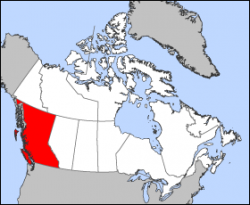British Columbia
British Columbia is the westernmost of Canada's provinces. It became a province in 1871. The capital is Victoria, and Vancouver is the largest city in BC. The province has a population of approximately 4,400,000 people.
History of hockey in British Columbia
The first organized game in British Columbia was played by the Vancouver Hockey Club on the Lake of the Woods on January 17, 1893.[1] There was also a game played in Nelson on the Kootenay Lake on March 4 of the same year. In 1895, a team from Golden, BC, faced the Calgary Fire Brigade in a competitive match.[2]
In January 1896, Nelson and Kaslo played a game against one another, and a four team tournament featuring teams from Rossland, Kaslo, Nelson, and Sandon was held that February. With the opening of an indoor rink in the now-ghost town of Sandon, the first indoor game was played between the Black's and the White's (6-3) in early February, 1897. On February 24, a Sandon team traveled to Kaslo and beat the hosts 5-2. A three-team tournament involving Kaslo, Rossland, and the hosts Sandon for the Silver Cup was played in March 1897.
An ice hockey tournament was played at the Rossland Winter Carnival between 1898 and 1917. The teams played, ostensibly, for the title of Champions of British Columbia.[3] The BCHL, which operated from 1900-1905, was the first ice hockey league in British Columbia. It featured teams from Rossland, Nelson, and Greenwood. Professional hockey came to British Columbia with the creation of the Pacific Coast Hockey Association in 1912. The PCHA was a premier league in Canada and the Vancouver Millionaires became the first west-coast team to win the Stanley Cup in 1915.
Women's hockey made its debut in Sandon in 1897 and a women's tournament was added to the program of the Winter Carnival in 1900. In 1911, rather humorously, the Carnival officials declared that the winner of the women's tournament would receive the honor of being "world champions". The Rossland Ladies' Hockey Team won every year through 1915.[4]
Women's teams from Vancouver, New Westminster, and Victoria set up their own competition for the "championship of British Columbia" in 1914. New Westminster won the first edition of the new championship. In 1918, the Vancouver team faced a new opponent made up of King George High School tournaments called the Amazons. The Amazons won the game and proclaimed themselves provincial champions. In 1921, the Pacific Coast Hockey Association organized a women's league featuring the Vancouver Amazons, Victoria Kewpies, and Seattle Vamps. The Amazons won the 1922 Alpine Cup, emblematic of the Banff Winter Carnival women's ice hockey championship. The Fernie Swastikas claimed the title in 1923. By the mid-1930s, women's hockey in British Columbia had practically died out, and was not revived again until the 1970s.
The first Provincial Senior Championship for the Savage Cup was contested in 1913. An Intermediate Championship for the Coy Cup began the same year, and Junior Playoffs were first held in 1919. Amateur hockey in the province was under the jurisdiction of the BC Amateur Athletic Union from 1912-1919, when the British Columbia Hockey Association was created. After the demise of the PCHA in 1924, some of the teams joined the Western Canada Hockey League, which itself folded in 1926 and brought an end to major professional hockey in the province for the time being.
Minor pro hockey soon came to British Columbia, with teams competing in the Pacific Coast Hockey League and the North West Hockey League. The senior circuit flourished during the 1920s and 1930s, with the province having some of the best amateur teams in the country. The Kimberley Dynamiters and Trail Smoke Eaters won the Allan Cup and went onto represent Canada in the World Championships in 1936 and 1938, respectively. The West Kootenay League was a premier senior league during this time period. It was situated an isolated, mountainous region that relied heavily on mining. The mining industry attracted a lot of hockey players who were able to get local jobs, a strong selling point during the Great Depression.
After World War II, the Western International Hockey League was formed in 1946 as the West Kootenay League expanded into Los Angeles and Spokane. The league remained the top senior competition in the west until it folded in 1988. Teams from British Columbia continued to fare well in the Allan Cup playoffs during the 1950s and 1960s. The province has had a total of 11 Allan Cup champions, most recently the Fort St. John Flyers in 2010.
The Western Hockey League, a minor pro league formed out of the PCHL and the Western Canada Senior League, featured teams from Victoria (Cougars, 1952-1961), New West Minster (Royals, 1952-1959), as well as the Vancouver Canucks, who ushered in the return of major pro hockey to British Columbia when they were accepted into the National Hockey League in 1970.
The British Columbia Hockey League was formed as the first-ever Junior "A" competition in the province in 1961. Vancouver and Victoria received teams in the Major Junior Western Hockey League in 1971. Nowadays there are six WHL franchises in British Columbia.
References
| Canadian Provinces | |
| Territories: | |
